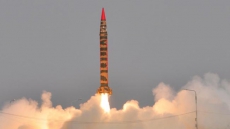Pakistan has played an active but negative role in Afghan affairs for decades, and Pakistan's security establishment, fearful of strategic encirclement by India, continues to view the Afghan Taliban as "a relatively friendly and reliably anti-India element in Afghanistan", says a US Congressional report.
Pakistan may view a weak and destabilized Afghanistan as preferable to a strong, unified Afghan state, especially one led by an ethnic Pashtun-dominated government in Kabul, says a report by the independent and bipartisan Congressional Research Service (CRS).
"Pakistan's security services maintain ties to Afghan insurgent groups, most notably the Haqqani Network, a U.S.-designated Foreign Terrorist Organization (FTO) that has become an official, semi autonomous component of the Taliban.
"Afghan leaders, along with US military commanders, attribute much of the insurgency's power and longevity either directly or indirectly to Pakistani support. President Trump has accused Pakistan of "housing the very terrorists that we are fighting."
It says that "US officials have long identified militant safe havens in Pakistan as a threat to security in Afghanistan, though some Pakistani officials dispute that charge and note the Taliban's increased territorial control within Afghanistan itself," it adds.
It says that India's diplomatic and commercial presence in Afghanistan, and the US' "rhetorical support for ita exacerbates Pakistani fears of encirclement.
Indian interest in Afghanistan stems largely from India's broader regional rivalry with Pakistan, which impedes Indian efforts to establish stronger and more direct commercial and political relations with Central Asia, the report adds.
The report says that President Trump "did encourage India to play a greater role in Afghan economic development", which "along with other Administration messaging, has compounded Pakistani concerns over Indian activity in Afghanistan."
"India has been the largest regional contributor to Afghan reconstruction, but New Delhi has not shown an inclination to pursue a deeper defence relationship with Kabul," it adds.
On the Afghan peace talks, it notes that insurgent and terrorist groups "have demonstrated considerable capabilities in 2019, throwing into sharp relief the daunting security challenges that the Afghan government and its US and international partners face. At the same time, prospects for a negotiated settlement, driven by direct US-Taliban talks, are uncertain in light of the September 2019 cancellation of those negotiations and the Taliban's continued refusal to talk to the Afghan government."
"US policy has sought to force the Taliban to negotiate with the Afghan government by compelling the group to conclude that continued military struggle is futile in light of combined US, NATO, and Afghan National Defence and Security Forces (ANDSF) capabilities.
"It is still unclear, however, how the Taliban perceives its fortunes; given the group's recent battlefield gains, one observer has said that "the group has little reason to commit to a peace process: it is on a winning streak."
It suggests that the US Congress "may examine how the US can leverage its assets, influence, and experience in Afghanistan, as well as those of Afghanistan's neighbours and international organizations, to encourage more equal, inclusive, and effective governance."

